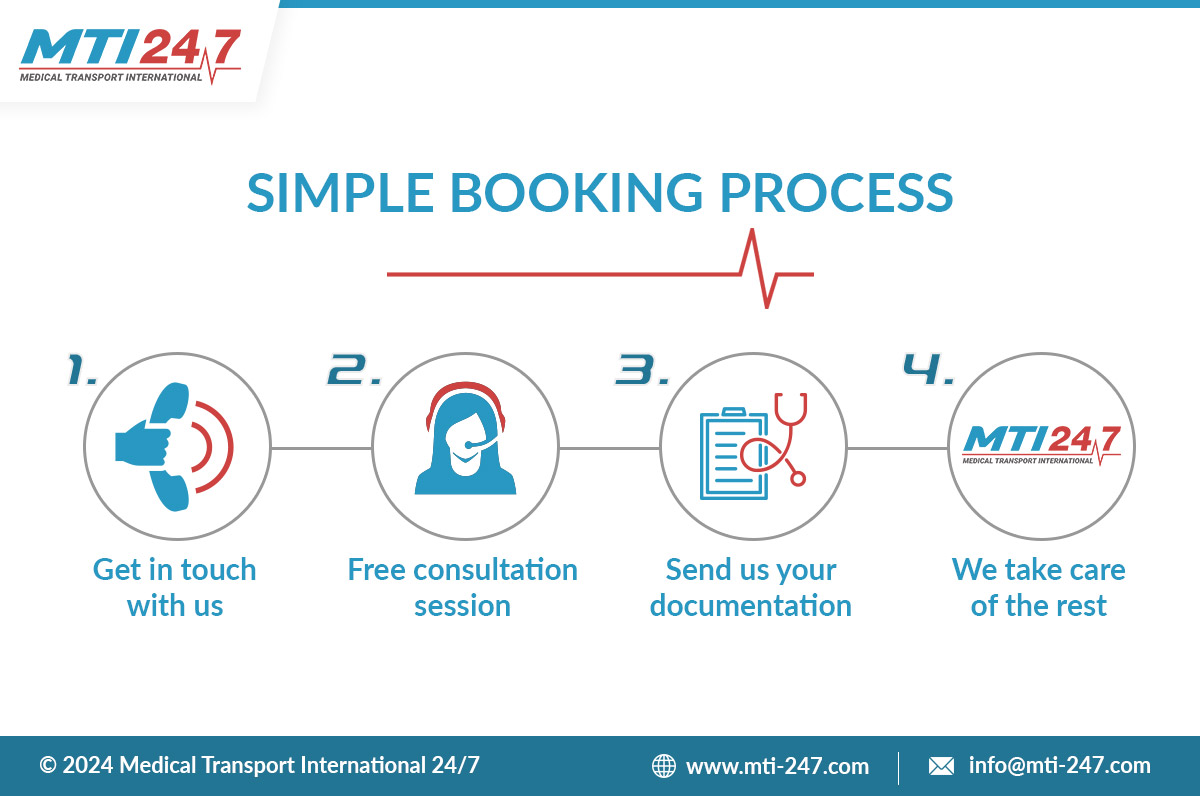Whether it is a minor fender-bender or a more serious collision, accidents can leave us with physical injuries, emotional scars, or both. One important question that often arises is: can you safely fly after an accident? Whether you are dealing with broken bones, a concussion, or any other injury, traveling by air might not be as straightforward as it once was. In this article, we will explore the factors to consider before booking your next flight.
Things to know about flying after an accident:
Flying after an accident is possible, but it depends on how severe your injuries are.
Flying too soon after an accident can worsen injuries, increase the risk of blood clots and infections, and cause psychological distress.
To fly safely after an accident, follow your doctor's advice, wear compression stockings, stay hydrated, and consider a medical escort or stretcher flight.
MTI 24/7 provides personalized medical flight solutions, including air ambulances with sea-level flight capabilities, to ensure the safety and comfort of patients.
Can you fly after an accident?
Yes, it is possible to fly after an accident, but it depends on the severity of your injuries and your recovery progress. Always consult your doctor to determine when it is safe to travel.
Factors affecting your ability to fly
Minor injuries: Typically allow for quicker return to air travel if no extensive treatment is required.
Serious injuries: May necessitate weeks or months of recovery before flying is safe.
Medical clearance: Airlines may require a doctor’s approval for travel, especially for recent or severe injuries.
Special assistance needs: Ensure mobility aids or medical equipment are arranged if necessary.
Rehabilitation status: Wait until critical recovery milestones are achieved to avoid complications.
Consulting with healthcare professionals and adhering to their advice is essential to ensure a safe and comfortable flight after an accident.
What are some of the most common types of accidents?
Accidents can happen to anyone, anywhere, at any time. However, some types of accidents are more likely to require medical repatriation or evacuation due to their severity and the specialized care needed for recovery. Common types of accidents include:
Severe burns or electrocution: Damage to skin and tissues often requires immediate treatment and advanced care.
Diving accidents: Can result in decompression sickness or paralysis, requiring hyperbaric and specialized medical support.
Sports injuries: May lead to broken bones, concussions, or paralysis, often needing urgent stabilization.
Slips and falls: Particularly serious for seniors and children, causing fractures, head trauma, or significant wounds.
Road accidents: Frequently result in traumatic brain injuries, spinal cord damage, or internal bleeding.
In these heart-stopping moments, prompt medical attention and specialized transportation are crucial to ensure the best possible outcome for the patient.

What are the risks or dangers of flying after an accident?
While it may be tempting to jump on a plane and head home or to a preferred medical facility, flying too soon after an accident can be risky. The dangers of flying prematurely after an accident include:
Worsening of injuries: Cabin pressure changes can aggravate head trauma, strain the lungs, and cause severe swelling and pain.
Infection risk: Recycled air and proximity to others may expose healing wounds or surgical sites to harmful bacteria.
Blood clots: Reduced air pressure, dry air, and prolonged immobility increase the risk of clot formation, especially with fractures or internal injuries.
Psychological distress: Anxiety from the trauma and a fear of flying can trigger acute emotional or psychological distress.
Medication/device complications: Managing oxygen therapy, medications, or medical devices at high altitudes may be difficult, potentially worsening conditions like hypoxia.
What steps can you take to fly safely after an accident?
If you have been cleared to fly after an accident, there are several steps you can take to ensure a safe and comfortable journey. First and foremost, follow your doctor's advice and any specific instructions they provide. This may include taking certain medications, or wearing supportive devices like a brace or cast.
Here are some other valuable tips for flying safely after an accident:
Book direct flights to minimize travel time.
Choose an aisle seat for easy leg stretching.
Pack necessary medical supplies and devices in your carry-on.
Wear compression stockings to prevent blood clots and swelling.
Stay hydrated by drinking water and avoiding alcohol and caffeine.
Carry medical documents, including a doctor's note and prescriptions.
Request assistance from airline staff for boarding, luggage, and special needs.
Consider flying with a medical escort.
How can our medical escort service help you fly safely after an accident?
Traveling after an accident requires careful planning and the right level of medical support. MTI 24/7’s medical escort and stretcher flight services provide safe and comfortable transport tailored to your condition.
Seated Patient Transport
Dedicated Medical Escort: Our escorts assist with medication management, toileting, and other personal care needs, ensuring your comfort throughout the journey.
Emotional Support: Our team provides reassurance and reduces stress, helping you feel more at ease during travel.
Comfortable Seating: Travel in business-class seating, offering ample space and extra comfort for a smoother experience.
Stretcher Flight
Lying Position: A stretcher is installed in economy class and a privacy curtain is installed, allowing for a comfortable and secure travel position during the flight.
Continuous Care: A trained medical crew accompanies you, offering expert attention and medical care throughout the journey.
Customized arrangements: Airlines collaborate with our team to arrange necessary accommodations, based on availability and medical needs.
Both options ensure a smooth and safe journey, with care tailored to your medical needs.

When are our air ambulances necessary after an accident?
Accident victims frequently require specialized transportation. This is typically observed in patients with serious injuries that require continuous medical care or for long-distance patient transportation. Our air ambulances offer a safe and efficient mode of transportation, outfitted with stretchers, cutting-edge medical equipment and staffed by a full medical crew. But that’s not all!
Our ambulance planes are capable of performing sea-level flights, during which the aircraft’s cabin pressure is regulated to simulate the atmospheric pressure found at sea level. This is particularly important for patients whose conditions may be adversely affected by changes in atmospheric pressure, such as:
Those with severe head injuries, as changes in pressure can worsen brain swelling.
Patients with lung damage or respiratory issues, as the lower air pressure at higher altitudes can cause difficulty breathing.
Individuals with unstable vital signs or cardiovascular problems, as the stress of changing air pressure can exacerbate their condition.
By maintaining a sea-level atmosphere throughout the flight, our air ambulances ensure that vulnerable patients can travel safely and comfortably. Consequently, risks such as hypoxia (lack of oxygen) or barotrauma (injury caused by pressure changes) are greatly reduced.
How can you book an air ambulance or a medical escort with MTI 24/7?
Our skilled medical specialists, together with our modern equipment, large aircraft fleet, and global presence, make us the first choice for patients looking for safe transportation following an accident.
Booking a medical flight with us is a straightforward process:
Contact us via phone or email, and one of our friendly representatives will assist you.
We will ask for details about your medical condition, travel requirements, and any special needs.
Based on the information provided, we will provide a personalized and non-binding quote.
Once you have reviewed and accepted the quote, we will proceed with organizing your medical flight.
Our team will handle all the logistics, from coordinating with medical facilities to arranging bed-to-bed transportation to and from the airports.
Throughout the process, our dedicated case managers will be available to answer any questions, and provide updates on your medical flight.

Contact us to fly safely after an accident!
If you or a loved one needs to fly after an accident, don't hesitate to reach out. Our experienced team is ready to provide personalized medical flight solutions, ensuring your safety and comfort every step of the way.
Reach us by:
Phone: USA: +1 646 335 06 83 / UK: +44 20 3608 0959
Email: info@mti-247.com
Our contact form
:quality(75))
:quality(75))